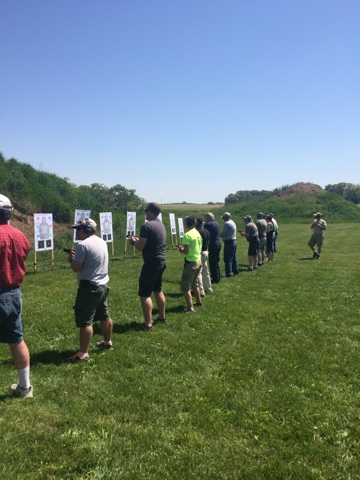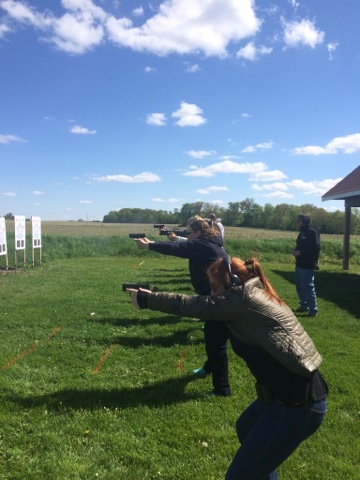Friday, May 27, 2016
Monday, May 23, 2016
Tuesday, May 17, 2016
PDN Live Event 25 May
New PDN Live event May 25 at 8:00 p.m. CST with Mike McElmeel and a panel of five other experts answering your defensive shooting questions! http://bit.ly/23WlcoI
Saturday, May 14, 2016
Women's Only Fundamentals of Concealed Carry 5.14.2016
Wednesday, May 11, 2016
Do we hold Military and Police Training in too high a regard?
Recently I wrote a short piece entitled Veterans and Concealed Carry: How Important is Training that was published on the Personal Defense Network. In a nutshell I encouraged military veterans to get additional training should they choose to carry a firearm in a public space. I would now like to look at law enforcement training in the same regard. Let me preface this by saying I have the utmost respect for law enforcement. I have many many friends on different departments acrossed the country and I myself am a reserve officer on two departments. That being said I believe most of my friends in law enforcement will agree with what I am about to say. Generally speaking your average law enforcement officer receives inadequate or outdated training when it comes to self defense employment of the firearm.
Recently I was in a Facebook conversation with an individual that held up law enforcement officers as the end all be all of defensive shooting. He opined that a run of the mill concealed carrier could not hope to achieve a commiserate level of skill as compared to these officers. When I disagreed with him he left the conversation with no rebuttal. Today I was talking to a young officer that has been through training with me and some other instructors I am familiar with and he described to me the varying combinations of stances and grips he had seen at the law enforcement range he was on. His description led me to believe that the majority of the officers present had not invested the requisite time needed to become as proficient in the use of their duty weapon as the general public may expect.
What do I base my assertion on? A few things really. First a common criticism by some is that concealed carriers are a danger to the public because they will not seek out or maintain adequate training unless mandated. I disagree with this assessment however I would submit that law enforcement officers are no different. Your local law enforcement officer is going to qualify with x number of rounds and receive x numbers of hours of training in the employment of their primary weapon while they are in the academy. Then besides the mandated yearly qualification, that's it. Just like concealed carriers unless individual officers or an enlightened department seek out additional training, skills will degrade. Now officers have many other skills they can draw on besides the use of deadly force,such as less than lethal deterrents and deescalation skills, but they are not exempt from the "use it or lose it" scenario.
Secondly budgets play a factor in this process. Should an officer have a desire to train but the department doesn't have the budget for ammunition beyond that yearly qualification, then the officer has a catch 22. They can either hope they maintain proficiency with the once yearly qualification or they must fund their own training. Some officers may not have the financial wherewithal to do this, so budgetary restrictions now force them to the lowest training level, despite a desire to train.
These factors could result in training that is potentially outdated and unrealistic. The goal of this training is to produce good qualification scores. Scores needed to justify continued budgetary allocations or check a box. Unfortunately this training may not correlate to the real life scenarios that officers encounter on the street. Rob Pincus developer of the Combat Focus Shooting program wrote an article in the July 2001 edition of SWAT Magazine entitled "Qualification is not training." Vance Rosen writing for the PoliceOne website wrote "Why training police merely to qualify isn’t enough." Both of these individuals stressed that realistic training needs to be given to our law enforcement professionals.
It can be seen that merely having a badge does not bestow upon the wearer any remarkable skills that can be employed in the context of a dynamic critical incident, unless those skills are trained frequently and as realistically as possible. Encourage your local law enforcement department to develop these skills in their officers.
Thursday, May 5, 2016
Sheriff's Tips: Empty Chambers
Sheriff's Tips: Empty Chambers: Do you carry your defensive handgun with a round in the chamber? Sheriff Jim Wilson says if you are not confident in this practice, get professional training.
Not sure why this seems so controversial. Unless you have time to preplan your attack then unchambered carry is irresponsible. If you have time to preplan your actions then you potentially have time to avoid the situation entirely. If you have time to react in this way instead of utilizing avoidance you could potentially be construed as an aggressor or mutual combatant.No, the more realistic scenario is that you will be ambushed probably at close range. In that context you will fail. You will fail to accomplish the very task you arm yourself to accomplish. That task is to protect yourself or others if you need to. Even if you carry with a round chambered you may fail. The firearm is not a magic talisman with mythical "stopping power". But carrying a weapon with an empty chamber is negligence and provides false hope. Get some training and quit being afraid.
Not sure why this seems so controversial. Unless you have time to preplan your attack then unchambered carry is irresponsible. If you have time to preplan your actions then you potentially have time to avoid the situation entirely. If you have time to react in this way instead of utilizing avoidance you could potentially be construed as an aggressor or mutual combatant.No, the more realistic scenario is that you will be ambushed probably at close range. In that context you will fail. You will fail to accomplish the very task you arm yourself to accomplish. That task is to protect yourself or others if you need to. Even if you carry with a round chambered you may fail. The firearm is not a magic talisman with mythical "stopping power". But carrying a weapon with an empty chamber is negligence and provides false hope. Get some training and quit being afraid.
Sunday, May 1, 2016
Subscribe to:
Posts (Atom)























